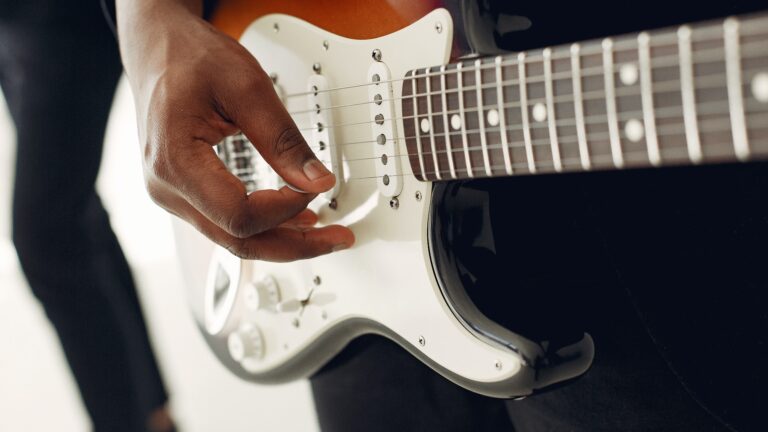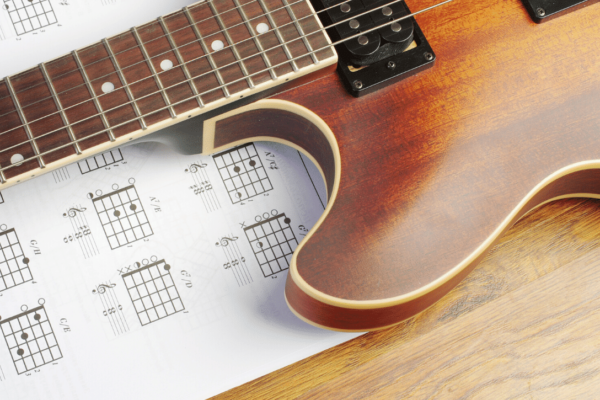Table of Contents
Guitar soloing is certainly one of the most difficult things to learn, and it takes a lot of practice. There are also several common questions guitar students have about what it takes to solo. Do you really need to learn all those fancy scales, to be able to solo? Can you improvise guitar solos without guitar scales? How can you solo without knowing scales?
There are many ways to solo without knowing scales, and today we will explain to you exactly how to do it.
How to solo without knowing scales
The base of guitar scales, soloing and improvisation is arpeggios. Arpeggios are the exact notes contained on a chord. Arpeggios are most of the time contained on the scales you are playing, with the addition of a few notes. However, arpeggios sound a lot better on top of a chord, because you are accentuating the same exact notes.
One of the best ways to learn improvisation, and to be able to solo over songs is to learn arpeggios and constantly practice them while playing a chord progression as a backing track. Once you know the exact placement of each note contained in the chord and play them over the chord, this is the best way to learn improvisation.
Once you master arpeggios, you can then start to add a few notes here and there. These notes will allow you to accentuate different tones. You will end up playing several guitar scales without even knowing you are playing them.
Do you have to know scales to solo?
No, you don’t have to know guitar scales to be able to solo over chords, however, they can be extremely helpful. Scales are also far easier to learn and master than arpeggios, and they also allow the guitar player to achieve a certain tonality.
Despite that, the best way to learn guitar improvisation and soloing techniques and phrases is to focus all of your attention on arpeggios. Learning and studying arpeggios, while practicing to play over them will give a very strong foundation to be able to include other notes and chromatisms later on.
By studying arpeggios you will also be able to play more melodic solos that sound better and fit the song perfectly.
How long does it take to learn scales on guitar?

Guitar scales can take some time to master, and an inexperienced player will take at least 1 week to be able to master a single scale. Experienced players, on the other hand, will be able to learn a single scale in a matter of minutes.
Some guitar players also have the ability to memorize scales faster, and this is mostly due to constantly practicing and learning new songs, chords, and solos. The more you practice the easier it will be to learn anything new on guitar.
The type of scale you are trying to learn will also have an influence. While some guitar scales are fairly straightforward and simple to learn, some can be complicated to memorize fast. Just remember to always practice scales and learn scales with a metronome to aid you to keep the right tempo, and developing your rhythm skills.
The best guitar scale to learn
By far the best guitar scale any guitarist can learn is the pentatonic scale. The reason is that it is one of the most versatile scales that can be used for a multitude of music genres. It will also help you to learn new scales, and incorporate chromatisms with the pentatonic scale, and it remains the most popular music scale ever.
The best guitar scale to learn is the major scale. The major scale is made up of seven notes, and it’s the simplest scale to learn on the guitar. The major scale can be used in a variety of different musical contexts, and it’s a great scale for soloing.
The pentatonic minor scale is the best guitar scale to learn. It consists of five notes and has a natural minor sound. The scale is easy to learn, and it can be used in a variety of musical situations.
Best way to learn pentatonic scale on guitar
The best way to learn the pentatonic scale on guitar is by first memorizing the shape of the scale while using a metronome. Once you have memorized the scale you want to practice it for at least a week, to make sure you can play it in several keys.
At the same time, you can start to take some of your practice time and apply the pentatonic scale over backing tracks. You can find plenty of backing tracks online on youtube for a certain key, and you can even choose a backing track with a specific music genre. In most of these tracks, you will be able to solo over them using the pentatonic scale.
This will allow you to get a better understanding of how to build guitar licks, and incorporate what you already know into your improvisation and soloing skills. Keep practicing and experimenting with different backing tracks to take your pentatonic soloing skills to the next level!
Conclusion
While learning guitar scales can be intimidating you do not have to rely on scales to be able to solo or improvise on guitar. In fact, most professional guitar players are not playing scales, they are just using arpeggios and incorporating different notes from different scales. This allows them to have a unique guitar phrasing style that can be hardly copied. Remember that soloing and improvising are about finding your own melodies and expressing your own music through notes, and for that, you do not need guitar scales.

I have been playing guitar for the past 15 years, and my knowledge and passion for guitars prompted me to start Guitaresque to share my knowledge, tips, and tricks with other guitar players. The sole purpose of this website is to help and inspire guitar players worldwide, to improve their playing and their love for guitars.






![How To Take Care of Your Hands To Play Guitar [9 Tips]](https://guitaresque.com/wp-content/uploads/2023/01/Depositphotos_72821727_S-600x400.jpg)


